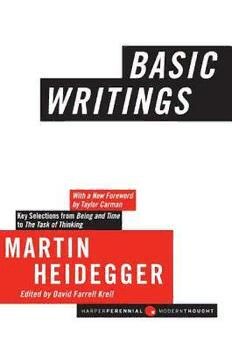
Basic Writings PDF
Preview Basic Writings
WRITINGS evised & Expanded Edition HarperCollins Editions of Martin Heidegger Basic Writings Being and Time Discourse on Thinking Early Greek Thinking The End of Philosophy Hegel’s Concept of Experience Identity and Difference Nietzsche: Volume I, The Will to Power as Art Nietzsche: Volume II, The Eternal Recurrence of the Same Nietzsche: Volume III, The Will to Power as Knowledge and as Metaphysics Nietzsche: Volume IV, Nihilism On the Way to Language On Time and Being Poetry, Language, Thought The Question Concerning Technology and Other Essays What Is Called Thinking? MARTIN HEIDEGGER BASIC W RITINGS from Being and Tim (1927) to '[Ju Task of 'fhinking (1964) REVISED AND EXPANDED EDITION EDITED, WITH GENERAL INTRODUCTION AND INTRODUCTIONS TO EACH SELECTION, BY DAVID FARRELL KRELL HarperSanFrancisco A Division of HarperCollinsPuWishers The selections in this volume are translated from the following German books: Sein und Zeit, © Max Niemeyer Verlag, 1972; Wegmarken, ©Vittorio Kloster- mann, 1976; Holzwege, © Vittorio Klostermann, 1972; Die Frage nach dem Ding, © Max Niemeyer Verlag, 1962; Vortrilge und Aufsiitze, © Verlag Gunther Neske, 1954; Was heisst Denken? © Max Niemeyer Verlag, 1971; Unterwegs zur Sprache, © Verlag Gunther Neske, 1959; Zur Sache des Denkens, © Max Niemeyer Verlag, 1969. Acknowledgment is made to Henry Regnery Company, Publishers, for permission to reprint “Modern Science, Metaphysics, and Mathematics” from What Is a Thing? © 1967 by Henry Regnery Company. Portions of this work originally appeared in somewhat different form in What Is Called Thinking? © 1968 in the English translation by Harper & Row, Publishers, Inc.; Poetry, Language, Thought, © 1971 by Martin Heidegger; On Time and Being, © 1972 by Harper & Row, Inc. basic writings. English translation © 1977, 1993 by HarperCollins Publishers, Inc. General Introduction and introductions to each selection © 1977, 1993 by David Farrell Krell. All rights reserved. Printed in the United States of America. No part of this book may be used or reproduced in any manner whatsoever without written permission except in the case of brief quotations embodied in critical articles and reviews. For information address HarperCollins Publishers, 10 East 53rd Street, New York, NY 10022. Library of Congress Cataloging-in-Publication Data Heidegger, Martin, 1889-1976. [Selections. English. 1993] Basic writings : from being and time (1927) to the task of thinking (1964) I Martin Heidegger ; [edited] by David Farrell Krell.—2nd, rev. and expanded ed. p. cm. Includes bibliographical references. Contents: Being and time : introduction—What is metaphysics?— On the essence of truth—The origin of the work of art—Letter on humanism—Modern science, metaphysics, and mathematics—The question concerning technology—Building dwelling thinking—What calls for thinking?—The way to language—The end of philosophy and the task of thinking. ISBN ^^3763-3 I. Krell, David Farrell. II. Title. B3279.H47E5 1992 193—dc20 91-58187 CIP 04 05 RRD H 30 29 28 27 26 25 to Hannah Arendt J. Glenn Gray Joan Stambaugh It is proper to every gathering that the gatherers assemble to coordinate their efforts to the sheltering; only when they have gathered together with that end in view do they begin to gather. —Martin Heidegger, Logos C O N T E N TS Preface ix General Introduction: The Question of Being 1 by David FARRELL KRELL I. Being and Time: Introduction 37 II. What Is Metaphysics? 89 III. On the Essence of Truth 111 IV. The Origin of the Work of Art 139 V. Letter on Humanism 213 VI. Modern Science, Metaphysics, and Mathematics 267 VII. The Question Concerning Technology 307 VIII. Building dwelling Thinking 343 IX. What Calls for Thinking? 365 X. The Way to Language 393 XI. The End of Philosophy and the Task of Thinking 427 Suggestions for Further Study 450 PREFACE This book offers a selection from the writings of the German think er Martin Heidegger, born September 26, 1889, in Messkirch, died May 26, 1976, in Freibyrg. Its dual purpose is to provide English speaking students of philosophy and of the arts and sciences with (1) an introduction to Heidegger’s thought, and (2) essays particu larly thought-provoking for students’ own areas of interest. It ad vances the claim to a “basic” selection only with the proviso that other essays excluded for reasons of length may be as basic for an understanding of Heidegger’s thought. Although Martin Heidegger studied plans for the volume during the winter and spring of 1974 75, generously offering suggestions concerning inclusions and ex clusions, the plan adopted here cannot be called an “authorized” one. Eleven selections appear: eight complete essays, two uncut excerpts from larger works, and one abridged piece. With the ex ception of Reading VI, “Modern Science, Metaphysics, and Math ematics,” the sequence of selections is chronological by order of composition. The major improvements in this second, revised and expanded edition of Basic Writings are these: (1) Heidegger’s most concise account of his thinking concerning language and propriation (Er- eignis) has been added (see Reading X, “The Way to Language”); (2) Reading IV, “The Origin of the Work of Art,” now appears com plete, including the Epilogue and the 1956 Addendum; (3) I have checked through each piece, correcting the errors that have come to my attention during the past fifteen years and making more con sistent the translation of a number of fundamental words. For ex ample, “clearing” is now used for Lichtung, “to propriate” for sich ix
